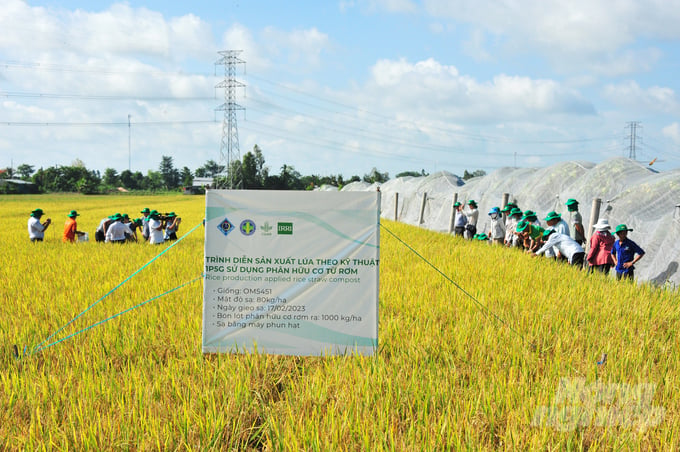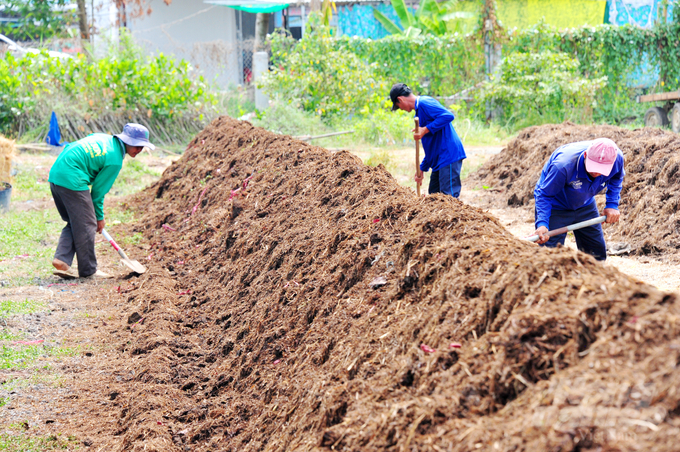May 21, 2025 | 08:37 GMT +7
May 21, 2025 | 08:37 GMT +7
Hotline: 0913.378.918
May 21, 2025 | 08:37 GMT +7
Hotline: 0913.378.918

Rice production model using organic compost made from straw in Thot Not District, Can Tho City. Photo: Le Hoang Vu.
Can Tho City's Sub-Department of Crop Production and Plant Protection recently collaborated with the International Rice Research Institute (IRRI) to organize a workshop on the "Rice production model using organic compost made from straw."
The model was implemented in the late summer-autumn crop of 2023 at the household belonging to Mr. Tran Van Dao in Tan Hung Ward, Thot Not District, Can Tho City on an area of 1.7 hectares. Accordingly, 1 hectare was designated for the utilization of organic compost made from straw. On the other hand, the remaining area of approximately 7 sao served as a control plot produced using traditional methods, which utilize 100% chemical fertilizers and pesticides sponsored by the Dam Phu My Fertilizer Company.
Mr. Tran Van Dao explained that the model's rice fields used organic production methods for this year's summer-autumn rice crop. Namely, he used 1 ton of straw compost per hectare, which was divided into multiple applications during the crop's growth. Additionally, a small amount of NPK fertilizer from Dam Phu My Fertilizer Company was incorporated to ensure sufficient nutrients for the growth of rice plants.
For the aforementioned crop, Mr. Dao planted OM5451 rice variety with a seeding rate of 80 kilogram per hectare. The organice rice production area in his family's field has achieved a fresh rice yield of 6.4 tons per hectare, which is 0.3 tons per hectare higher than the control field.
According to Ms. Pham Thi Minh Hieu, General Director of Can Tho City's Sub-Department of Crop Production and Plant Protection, the organic compost made from straw, which was applied at a rate of 1 ton per hectare, has helped develop an extensive and deep root system compared to fields without organic compost. This enhanced root system makes the rice plants sturdier, less prone to lodging, and reduces post-harvest losses.

Farmers are being guided through the technical process of handling and converting straw into organic compost at the model farm. Photo: Le Hoang Vu.
The rice production model utilize certified and higher-quality seeds, which are sown at a sparse density of 80 kilograms per hectare, and receive an initial application of organic fertilizer. This approach helps reduce the amount of nitrogen fertilizer used, limits the risk of pest and disease outbreaks, and subsequently decreasing the requirement for pesticides. This leads to cost savings in production, increased productivity, higher profits, and improved rice grain quality.
According to Ms. Pham Thi Minh Hieu, the city's agricultural sector is currently implementing multiple pilot rice production models using organic compost made from straw in conjunction with the "1 must, 5 reductions" technique. These models are being deployed in the districts of Thoi Lai, Co Do, and Thot Not with each model covering 1 hectare of production area. Additionally, the models have successfully completed two rice crops with a total of 6 models implemented in the 2023 winter-spring and summer-autumn crops.

The model that utilizes organic compost made from straw has achieved a fresh rice yield of 6.4 tons per hectare, which is 0.3 tons per hectare higher than the control field. This higher yield has resulted in a profit of over 30 million VND per hectare.
Based on assessment results, this production model helps farmers reduce their expenses on fertilizers and chemical pesticides by 35 - 40% while increasing profits by an additional 10% per unit area compared to traditional production methods.
"The organic production approach with organic compost made from straw has significantly reduced production costs for farmers. The agricultural sector in Can Tho recommends further popularizing and replicating this model in the near future," said Ms. Pham Thi Minh Hieu.
Ms. Dinh Thi Kim Dung, Head of the Office of the International Rice Research Institute in Vietnam, stated that the IRRI has collaborated with Can Tho city's Sub-Department of Crop Production and Plant Protection since 2022 to provide training for local farmers on utilizing and converting straw into organic compost for rice.
Upon returning to the city, the news reporters observed that farmers using organic compost made from straw compost have harvested healthy rice crops with fewer pests, and the yields have significantly increased. Evidently, this is a sustainable and environmentally friendly agricultural production model that reduces greenhouse gas emissions, and adapts to climate change in addition to minimizing production costs, producing safe and high-quality products.
Translated by Nguyen Hai Long

(VAN) Japan's grant aid project contributes to capacity building, promoting organic agricultural production, and fostering sustainable community development in Dong Thap province.

(VAN) For years, the CRISPR-Cas9 genome technology has been reshaping genetic engineering, a precision tool to transform everything from agriculture to medicine.

(VAN) Vietnam aims to become a 'leader' in the region in the capacity and managing effectively soil health and crop nutrition.
![Reducing emissions from rice fields: [Part 1] Farming clean rice together](https://t.ex-cdn.com/nongnghiepmoitruong.vn/608w/files/news/2025/05/05/z6509661417740_a647202949c539012a959e841c03e1d3-nongnghiep-143611.jpg)
(VAN) Growing clean rice helps reduce environmental pollution while increasing income, allowing farmers to feel secure in production and remain committed to their fields for the long term.
/2025/05/19/5136-1-144800_230.jpg)
(VAN) The Nghe An Provincial People's Committee has just approved the list of beneficiaries eligible for revenue from the Emission Reductions Payment Agreement (ERPA) in the North Central region for the year 2025.

(VAN) 14 out of 35 domesticated elephants in Dak Lak province have had their living conditions improved, with 11 of them currently participating in the non-riding elephant tourism model.

(VAN) Muong Nhe Nature Reserve hopes that being upgraded to a national park will lay the foundation for forest protection efforts to be carried out in a systematic, modern, and sustainable manner.